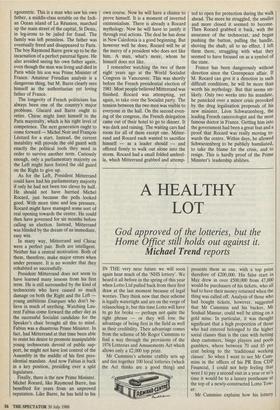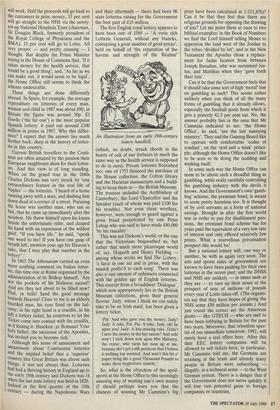A HEALTHY LOT
God approved of the lotteries, but the Home Office still holds out against it.
Michael Trend reports
IN THE very near future we will soon again hear much of the 'NHS lottery'. We heard it all before in the spring of this year when Lotto Ltd pulled back from their first draw at the last moment because of legal worries. They think now that their scheme is legally watertight and are on the verge of relaunching it; but this time Lotto will have to go for broke — perhaps not quite the right phrase — or they will lose the advantage of being first in the field as well as their credibility. Their advantage comes from the scheme of Mr Roger Cummins to find a way through the provisions of the 1976 Lotteries and Amusements Act which allows only a £2,000 top prize.
Mr Cummins's scheme craftily sets up and ties together 100 local lotteries (which the Act thinks are a good thing) and presents them as one, with a top prize therefore of £200,000. His false start in May drew in over £500,000 from 47,000 would-be purchasers of his tickets, who all had to have their money returned when the thing was called off. Analysis of those who had bought tickets, however, suggested that Mr Cummins and his backer, Mr Souhail Mansur, could well be sitting on a gold mine. In particular, it was thought significant that a high proportion of those who had entered belonged to the higher social classes than is the case with betting shop customers, bingo players and pools gamblers, where between 70 and 85 per cent belong to the 'traditional working classes'. So when I went to see Mr Cum- mins in the offices of his PR firm CDP Financial, I could not help feeling that were Ito pay a second visit in a year or so's time it would be to a luxury penthouse at the top of a newly-constructed Lotto Tow- er.
Mr Cummins explains how his lottery will work. Half the proceeds will go back to the customers in prize money; 35 per cent will go straight to the NHS via the newly- set-up National Hospitals Trust (chairman, Sir Douglas Black, formerly president of the Royal College of Physicians and the BMA); 15 per cent will go to Lotto. All very proper — and pretty cunning — I thought. But despite the Prime Minister saying in the House of Commons that, 'If it raises money for the health service, that would be a good thing', and, 'As far as we can make out, it would seem to be legal', the Home Office still seems to think the scheme undesirable.
These things are done differently abroad. In Spain, for example, the average expenditure on lotteries of every man, woman and child in 1987 was about £90; in Britain the figure was around 50p. El Gordo (`the fat one') is the most popular Spanish lottery: it paid out around £100 million in prizes in 1987. Why this differ- ence? I expect that the answer lies much further back, deep in the history of lotter- ies in this country.
Current British travellers to the Conti- nent are often amazed by the passion their European neighbours show for their lotter- ies. And this view is of long standing. When on the grand tour in the 1840s Charles Dickens was very struck by 'one extraordinary feature in the real life of Naples' — the lotteries. 'I heard of a horse running away with a man, and dashing him down dead at a corner of a street. Pursuing the horse was another man, who ran so fast, that he came up immediately after the accident. He threw himself upon his knees beside the unfortunate rider, and clasped his hand with an expression of the wildest grief. "If you have life," he said, "speak one word to me! If you have one gasp of breath left, mention your age for Heaven's sake, that I may play that number in the lottery".'
In 1863 The Athenaeum carried an even more scathing comment on Italian lotter- ies, this time one at Rome organised by the administration of its Bishop himself. 'Are not the pockets of his Holiness sacred? And are they not about to be filled now? Peal, ye bells! Send the good message towards Heaven! Close to me is an elderly bearded man, his eyes fixed on the bal- cony; in his right hand is a crucifix, in his left a lottery ticket; he contrives to let the Ticket come into contact with the crucifix, as if kissing it. Hearken, ye Romans! Your holy father, the successor of the Apostles, has invited you to become rich.'
Although this sense of amusement and amazement about Continental lotteries and the implied belief that a 'superior' country like Great Britain was above such things, it was not always thus. Lotteries had had a thriving history in England up to the early 19th century and Dickens was 14 when the last state lottery was held in 1826. Indeed in the first quarter of the 19th century — during the Napoleonic Wars and their aftermath — there had been 96 state lotteries raising for the Government the best part of £10 million.
The first English royal lottery appears to have been one of 1569 — 'A verie rich Lotterie Generall, without any blanks, contayning a great number of good prices', held on behalf of 'the reparation of the havens and strength of the Realme'
An illustration from an early 19th-century lottery handbill.
(which, no doubt, struck chords in the hearts of oak of our forbears in much the same way as the health service is supposed to do in ours). Private lotteries flourished too: one of 1753 financed the purchase of the Sloane collection, the Cotton library and the Harleian manuscripts and a build- ing to keep them in — the British Museum. The trustees included the Archbishop of Canterbury, the Lord Chancellor and the Speaker (each of whom was paid £100 for his trouble). Not even these worthies, however, were enough to guard against a gross fraud perpetrated by one Peter Lehup who was said to have made £40,000 'by his rascality'.
This was not Dickens's world, or the one that the Victorians bequeathed us, but rather that much more picaresque world of, say, Hogarth and Henry Fielding among whose works we find The Lottery, 'a farce in one act and in prose, with the musick prefix'd to each song'. There was also a vast amount of ephemera connected with the golden age of English lotteries. This excerpt from a broadsheet 'Dialogue', which now appropriately lies in the British Museum collections, gives their general flavour: Judy, whom I think we can safely take to be an Irish maid, has been given a lottery ticket.
'Pat: And who gave you the money, Judy? Judy: A rake, Pat. Pat: A rake, Judy, oh! fie upon you! Judy: A hay-making rake. Didn't I save the money in the hay saison? And och! won't I look down now upon Mrs Maloney, the cratur, who turns her nose up at me, because she's got a silk petitcoat that I belave is nothing but worsted. And won't this bit o' paper bring me a good Thousand Pounds to make these bogtrotters trimble.'
So, what is the objection of the spoil- sports at the Home Office to this seemingly amusing way of wasting one's own money (I should perhaps warn you that the chances of winning Mr Cummins's big prize have been calculated at 1:211,876)? Can it be that they feel that there are religious grounds for opposing the drawing of lots? Let me point them at once to two biblical examples: in the Book of Numbers we find the Lord himself telling Moses to apportion the land west of the Jordan to the tribes 'divided by lot'; and in the New Testament the Apostles chose a replace- ment for Judas Iscariot from between Joseph Barsabas, who was surnamed Jus- tus, and Matthias when they 'gave forth their lots'.
Can it be that the Government feels that it should take some sort of high 'moral' line on gambling as such? This seems rather unlikely when you think of all the many forms of gambling that it already allows, especially the football pools from which it gets a princely 42.5 per cent cut. No, the answer probably lies in the area that Mr Cummins indicated to me: 'the Home Office', he said, 'are the last nannying ministry'. They and the Gaming Board like to operate with comfortable 'codes of conduct', on the 'nod and a wink' princi- ple; although the Home Office doesn't like to be seen to be doing the nodding and winking itself.
In some such way the Home Office can seem to be above such a dreadful thing as gambling, while really carefully controlling the gambling industry with the devils it knows. And the Government's own 'gamb- ling' scheme, the premium bond, is meant to seem pretty harmless too. It is thought of by civil servants as a form of national savings. Brought in after the first world war in order to pay for disablement pen- sions, the premium bond scheme has for years paid the equivalent of a very low rate of interest and only offered relatively low prizes. What a marvellous privatisation prospect this would be!
But a national lottery will, one way or another, be with us again very soon. The arts and sports sides of government are known to have been pushing for their own lotteries in the recent past; and the DHSS and NHS are unlikely — in times such as they are — to turn up their noses at the prospect of tens of millions of pounds every year if Lotto takes off. (The organis- ers say that they have hopes of giving the NHS some £50 million per annum.) And just round the corner are the American giants — like GTECH — who are said to have been lobbying in Britain for the past two years. Moreover, that relentless spec- tre of our immediate tomorrow, 1992, will surely have a real effect here. After this date EEC lottery companies will be allowed to sell tickets here; in particular, Mr Cummins told me, the Germans are straining at the leash and already many people in Britain were subscribing illegally, in a technical sense — to the West German system. There is a danger that if the Government does not move quickly it will lose vast potential gains to foreign companies or countries.















































 Previous page
Previous page